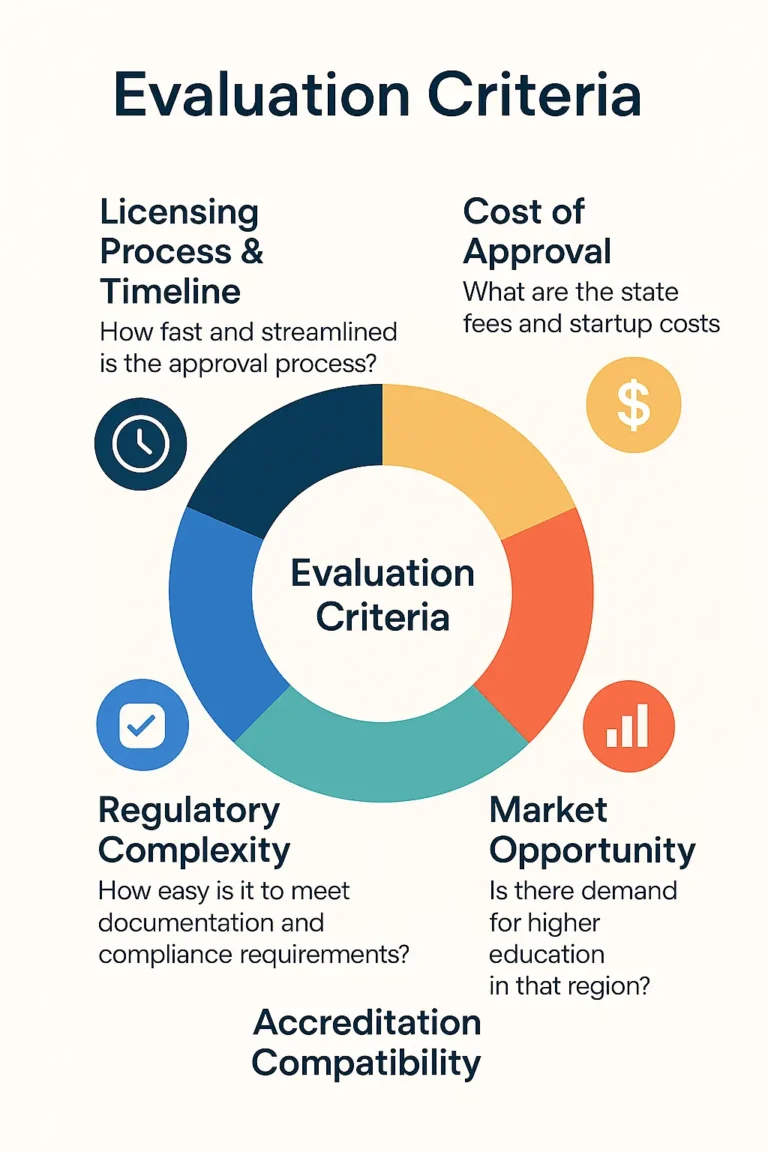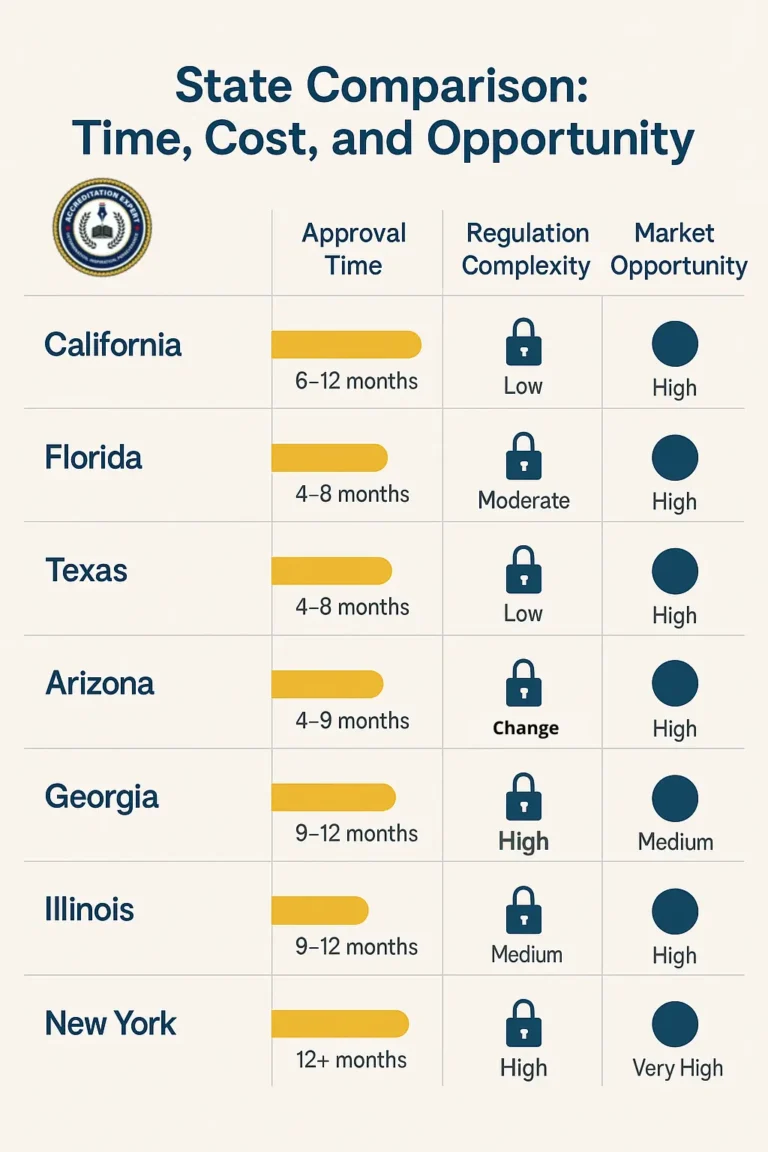Best States to Open a University in the U.S. – 2026 Guide for Education Entrepreneurs

Thinking About Opening a University in the U.S.?
If you’re an education entrepreneur dreaming of launching a university in the United States, you’re not alone. But while the idea is exciting, navigating the legal requirements, licensing process, and costs can be overwhelming. Not all states offer the same path to approval—some are smoother, faster, and more affordable than others.
This 2026 guide breaks down the best U.S. states to open a university for your specific needs so you can move forward with clarity, confidence, and a smart plan. Whether you’re targeting online learners, international students, or niche graduate programs, choosing the right state is the critical first step.
How We Chose the Best States for Starting a University
Not every state in the U.S. is equally friendly to new higher education institutions. Some states have streamlined, business-friendly processes; others have more red tape. To help you make an informed decision, we evaluated states based on five key criteria:

| Criteria | Description |
|---|---|
| Licensing Process & Timeline | How fast and streamlined is the approval process? |
| Cost of Approval | What are the state fees and startup costs? |
| Regulatory Complexity | How easy is it to meet documentation and compliance requirements? |
| Market Opportunity | Is there demand for higher education in that region? |
| Accreditation Compatibility | Does the state support institutions seeking national or regional accreditation? |
These factors directly affect how long it takes to launch, how much you spend, and how sustainable your institution will be in the long run. Some states, like Arizona and Florida, offer quick pathways to approval, while others such as New York are more rigorous but can offer high long-term rewards.
Top States to Start a University in 2026

Here are the top 7 states that stand out for education entrepreneurs. Each comes with its pros, challenges, and key regulatory bodies.
California (BPPE)
- Why it’s great: California has one of the largest student populations and a massive international student presence. There’s consistent demand for niche graduate programs, particularly online.
- Licensing body: Bureau for Private Postsecondary Education (BPPE)
- Timeline: Average 6–12 months for approval
- Challenges: Heavy documentation and regulatory oversight. California requires detailed programmatic information, personnel qualifications, and ongoing compliance audits.
Florida (CIE)
- Why it’s great: With favorable policies for online and distance education, Florida is often seen as the quickest and most cost-effective state to start a school.
- Licensing body: Commission for Independent Education (CIE)
- Timeline: 4–8 months
- Challenges: Must demonstrate financial stability and, in some cases, maintain a physical presence.
Texas (THECB)
- Why it’s great: Texas is experiencing massive population growth and has a diverse economy that supports higher education institutions.
- Licensing body: Texas Higher Education Coordinating Board (THECB)
- Timeline: 6–12 months
- Challenges: Requires thorough documentation of governance, faculty qualifications, and curriculum rigor.
Arizona
- Why it’s great: Known for its flexible regulatory environment, Arizona is a rising star for online institutions.
- Licensing body: Arizona State Board for Private Postsecondary Education
- Timeline: 4–9 months
- Challenges: Requires proof of financial sustainability and strong student policies.
Georgia
- Why it’s great: Georgia offers a relatively low-cost entry point and is home to a rapidly expanding college-age population.
- Licensing body: Georgia Nonpublic Postsecondary Education Commission (GNPEC)
- Timeline: 6–9 months
- Challenges: Approval process requires a well-developed business plan and academic framework.
Illinois
- Why it’s great: Illinois offers access to the Chicago metropolitan market, a hub for both local and international students.
- Licensing body: Illinois Board of Higher Education
- Timeline: 9–12 months
- Challenges: Significant paperwork and legal compliance requirements, especially around consumer protection.
New York (NYSED)
- Why it’s great: Prestige and access to diverse populations make New York a powerhouse, especially for specialized programs.
- Licensing body: New York State Education Department (NYSED)
- Timeline: 12+ months
- Challenges: Most rigorous approval process in the U.S., including curriculum-level scrutiny.
Comparison Summary: Time, Cost, and Opportunity

| State | Approval Time | Regulation Complexity | Market Opportunity |
|---|---|---|---|
| California | 6–12 months | High | High |
| Florida | 4–8 months | Moderate | High |
| Texas | 6–12 months | Moderate-High | Very High |
| Arizona | 4–9 months | Moderate | Medium-High |
| Georgia | 6–9 months | Moderate | Medium |
| Illinois | 9–12 months | High | High |
| New York | 12+ months | Very High | High |
Common Mistakes When Choosing a State
- Choosing a state just because it’s cheaper
- Ignoring long-term accreditation needs
- Overlooking specific state-level education laws
Want to avoid these mistakes? Accreditation Expert Consulting can guide your decision based on your mission, target audience, and delivery model.
Our Recommendation + Free Consultation

At AccreditationXpert, we’ve helped dozens of education entrepreneurs get approved in record time across California, Florida, Texas, and more.
Whether you’re launching a traditional university or an online institution, we know the ins and outs of every state’s licensing process.
We can help you choose the best state based on your unique criteria, goals, and resources.
Book a free consultation and take the first step toward your dream university.
Best States to Open a University
Frequently Asked Questions (FAQs)
Arizona and Florida are among the easiest, thanks to lower fees and faster approvals.
Most schools are approved within 6 to 12 months by the BPPE.
Florida and Texas are top picks due to tech-readiness and student demand.
No, but you should plan for it early. Some states require you to pursue accreditation within a set timeline.
Yes. You can incorporate and apply for approval as a foreign national or through a U.S.-based entity.

